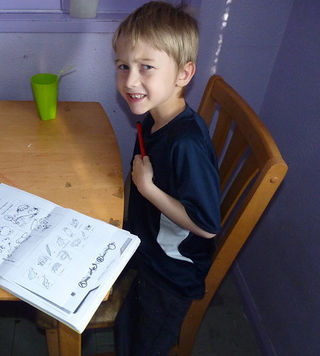Motivation
Not All Homework Help Is Helpful
Parents helping kids with homework can sometimes backfire.
Posted September 25, 2019 Reviewed by Gary Drevitch

Here’s a scenario that happens every school night in many homes: A parent says to a child, “Let me see your homework.” The child grudgingly hands it over. The parent checks the homework and sees that the child made a number of mistakes. When the parent says, “You need to redo these,” the child yells, cries, argues, or balks.
Many parents believe that they’re not doing their job unless they check their kids’ homework. But these efforts often turn into ugly scenes that end with both parents and children feeling frustrated and upset.
Obviously, parents insist on many things that upset children, such as brushing teeth or cleaning up their rooms, but battles over correcting homework may cause more harm than good.
Research on parental help with homework
Perhaps surprisingly, research on parental help with homework shows little or no benefit. A recent quantitative review of over 400 studies by Michael Barger and colleagues found that, overall, there’s a small positive link between parental school involvement and children’s academic achievement, engagement, and motivation, and even to children’ social and emotional adjustment. When parents are involved at school, when they’re interested and encouraging about children’s schoolwork, or when they offer intellectual stimulation at home such as reading a book together, children tend to do better academically and feel more motivated. On the other hand, homework help from parents is linked to lower achievement and isn’t related to children’s academic engagement or motivation.
One possible explanation for the link between homework help from parents and lower achievement could be that parents are more likely to step in when kids are struggling with homework. This seems very likely.
Another possible explanation is that unpleasant interactions like the one described above create feelings of anger and resentment in kids and parents.
Research findings are based on “averages,” which may or may not be relevant for your particular child, but, at a minimum, we can say that checking your child’s homework is not a must-do and could even backfire.
Some good reasons to avoid checking your child’s homework
In addition to the negative reactions it tends to provoke, there are other reasons why you might want to avoid checking your child’s homework:
- It interferes with communication with teachers by making it harder for teachers to see what children do or don’t understand.
- It suggests that mistakes are intolerable and implies to kids, "You're not capable of doing homework on your own!' or even, “Your work isn’t good enough to be seen in public, so I have to correct it!”
- It creates confusion about whether responsibility for homework belongs to the parent or the child.
- It can lead to kids giving up too easily. If they know their parents are going to check everything, what’s the point of trying?
Homework help that’s actually helpful
So, what should parents’ role be when it comes to children’s homework? Don’t assume that your involvement with homework is necessary. If your child is generally a good student, you may not need to do anything to help with homework. Just having a positive attitude toward school and education and being interested in what your child is learning may be enough.
If possible, try to be available if your child is confused and wants to ask you to explain something about homework. Letting your child come to you to ask for help, if needed, makes it more likely that your child will get the right type of assistance. It also keeps the responsibility for homework on your child’s shoulders and lets you stay in a supporting role.
But what if your child often struggles with homework? From a kid’s point of view, there’s nothing worse than thinking you’ve finished your homework and then being told, “Nope. You did it wrong. Do it over!” Rather than correcting your child’s homework, it may be better to offer your help up front, to set your child up for success. Here are some ways to do that:
-
Create routines. Work with your child to figure out a location and time for doing homework that minimize distractions and promote productivity.
-
Go over directions to be sure your child understands what to do. Some kids tend to skip reading instructions. It may be helpful to have your child read instructions aloud while circling or underlying key words. For more complex directions, you may want to have your child restate them in his or her own words.
-
Break down large tasks. If your child gets overwhelmed by large assignments, creating a plan together and spelling out manageable steps could help your child get moving and get it done.
-
Consider the grading rubric to help avoid wasted effort. Some kids tend to get lost in the details. It’s discouraging for children to spend a large amount of time on one tiny aspect of a project and then have to rush on the main parts. Use the rubric to help your child figure out “Which ingredients does the teacher think are most important?” and “Which ingredients are less important?”
-
Check only for completion. If your child often avoids homework, skips items, or overlooks the back page, you may need to check just that the work is done. Or, better yet, encourage your child to quickly scan the pages or cross items off a list of assignments.
If homework is routinely difficult, talk with the teacher. Having children endure hours of misery over homework isn’t useful or kind. The teacher may be able to suggest sources of help or perhaps reduce the homework load.
See the big picture
Our goal for our children is not to have them do well on one particular assignment, but to help them become capable learners. If we intrude too much or shower them with criticism, it won’t help them embrace effort or curiosity.
We need to make room for children to try, and maybe mess up, and try again.
But taking a step back from homework help can be challenging as a parent. It means that when you visit your child’s school for parents’ night, some other kid’s sugar cube sculpture might look like the work of a professional engineer—because it was. And your child’s sugar cube sculpture will look like the work of an eight-year-old—because it was. That’s a good thing.
Related posts:
References
Barger, M. M., Kim, E. M., Kuncel, N. R., & Pomerantz, E. M. (2019). The relation between parents’ involvement in children’s schooling and children’s adjustment: A meta-analysis. Psychological Bulletin, 145(9), 855-890.




